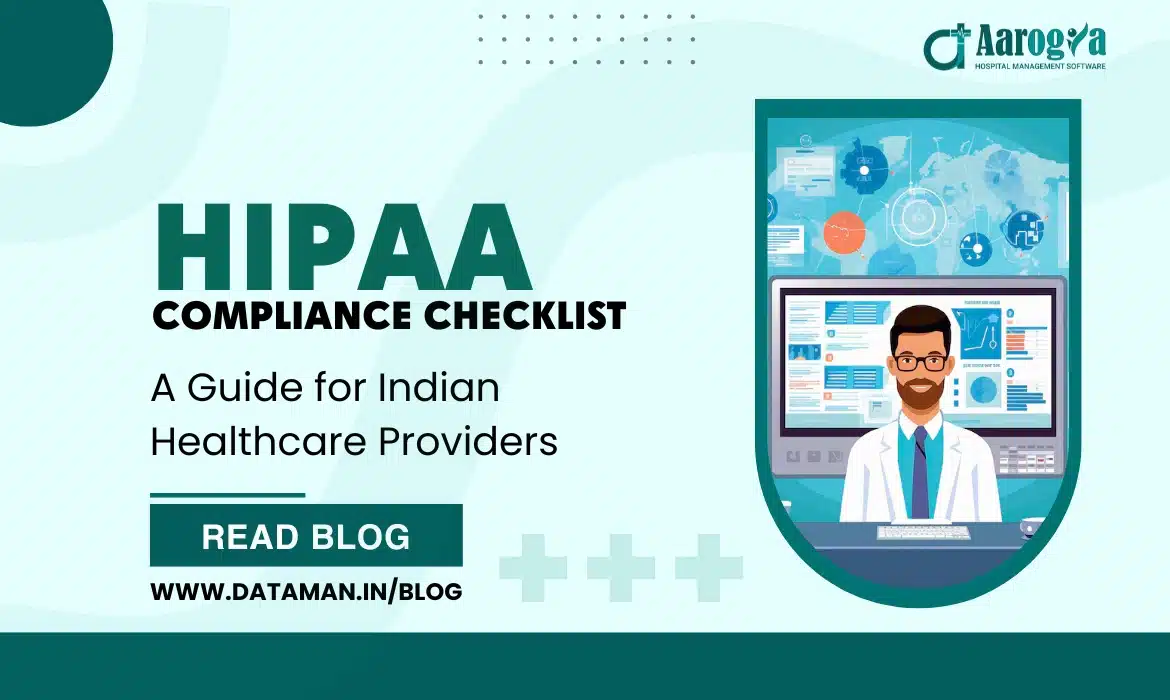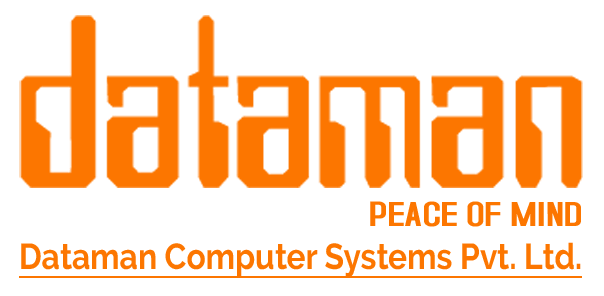- +91 9511117684
- shweta@dataman.in

Table of Contents
Post Views: 11,691
The Health Insurance Portability and Accountability Act (HIPAA) was enacted in 1996 to safeguard the privacy and security of patient’s health records(EHR). It established a set of national standards for the protection of EHR to ensure that individuals have control over their personal health data. HIPAA is a crucial component of the healthcare landscape, as it helps to maintain patient trust, prevent data breaches, and comply with legal requirements.
However, adhering to HIPAA compliance can be a complex and daunting task for healthcare organizations. They must choose a solution that is capable enough to navigate a labyrinth of regulations, implement robust security measures, and train their staff to handle EHR appropriately. The challenges faced by healthcare organizations include:
- Data breaches
- Complex regulations
- Limited resources
- Rapidly evolving technology
Read More: Top 5 Hospital Management Software in India
HIPAA Compliance Checklist
The following checklist outlines the key areas that software development companies must address:
Risk Assessment
- Conduct a thorough risk assessment to identify potential vulnerabilities in your systems and EHR.
- Prioritize risks based on their likelihood and impact.
- Develop a plan to mitigate identified risks and vulnerabilities.
Security Policies and Procedures
Implement robust security measures to protect patient data, such as:
- Access controls: Restrict access to patient information based on roles and responsibilities.
- Encryption: Encrypt sensitive data both at rest and in transit.
- Physical security: Protect physical facilities and equipment from unauthorized access.
Technical Controls
- Implement firewalls, intrusion detection systems, and encryption.
- Keep all software and hardware components up-to-date with the latest security patches and updates.
Physical Security
- Implement physical safeguards to protect EHR from unauthorized access, theft, or loss. This may involve using locked storage facilities, access controls, and surveillance systems.
- Restrict access to EHR on a need-to-know basis. Only authorized personnel should have access to sensitive patient information.
Business Associate Agreements
- If you work with business associates who handle patient data, ensure that they have appropriate safeguards in place.
- Establish Business Associate Agreements (BAAs) that outline the responsibilities and obligations of both parties.
Incident Response Plan
Create a detailed incident response plan to address security breaches effectively. This should include steps for identifying, containing, and remediating incidents, as well as notifying affected individuals and regulatory authorities.
Monitoring and Auditing
- Regularly monitor compliance: Conduct ongoing monitoring activities to ensure that your software and processes are in compliance with HIPAA. This may involve reviewing access logs, auditing systems, and conducting security assessments.
- Conduct audits to identify gaps: Periodically conduct audits to identify any gaps in your compliance program. This can help you to address issues proactively and maintain a high level of security.
Read More: Ayushman Bharat Digital Mission (ABDM): A Quick Guide
Empowering HIPAA Compliance with Our Hospital Management Software (HMIS)
At Aarogya, we understand the critical importance of HIPAA compliance for healthcare organizations. Our hospital management software is meticulously designed to provide a robust and comprehensive solution that safeguards patient health information and streamlines compliance efforts.
Key Features for HIPAA Compliance:
- Robust Access Controls: Granular access controls are implemented through our software solution to ensure that only authorized personnel can access EHR. This helps to prevent unauthorized disclosure and protect patient privacy.
- Advanced Encryption: We employ state-of-the-art encryption algorithms to safeguard EHR both at rest and in transit. This protects against unauthorized access and data breaches.
- Audit Trails: Our software maintains detailed audit trails, tracking all user activities and system events. This enables organizations to monitor compliance, identify potential vulnerabilities, and respond to incidents promptly.
- Risk Assessment Tools: Aarogya incorporates tools to help healthcare organizations conduct regular risk assessments and identify potential threats to EHR. This proactive approach allows for timely mitigation of risks and prevention of breaches.
- Business Associate Management: We provide features to manage business associate agreements (BAAs) effectively. Our software ensures that all business associates comply with HIPAA requirements, reducing the risk of data breaches.
- Incident Response Planning: The software system includes templates and tools to help healthcare organizations develop comprehensive incident response plans. This ensures that they are prepared to respond effectively to security breaches and minimize their impact.
- Employee Training: Integrated training modules are provided by software and our team to help healthcare organizations educate their staff on HIPAA compliance. This ensures that employees are aware of their responsibilities and can handle EHR appropriately.
How Our Software Simplifies HIPAA Compliance
- Centralized Management: Our software provides a centralized platform for managing HIPAA compliance efforts. This simplifies the process, reduces administrative burden, and ensures consistency across the organization.
- Automation: Our software automates many of the routine tasks associated with HIPAA compliance, such as risk assessments, audit reviews, and reporting. This frees up valuable time for healthcare professionals to focus on patient care.
- Continuous Monitoring: Our software provides real-time monitoring of compliance activities, allowing organizations to identify and address potential issues promptly. This helps to prevent breaches and maintain compliance.
- Expert Support: We in-house a team of more than 30 experts to provide guidance and support throughout the HIPAA compliance journey. We can help organizations navigate complex regulations, implement best practices, and address any challenges they may encounter.
Read More: WhatsApp Automation for Hospitals
Conclusion: HIPAA Compliance Checklist
In conclusion, HIPAA compliance checklist is a critical responsibility for software development companies that work with healthcare organizations. By following the key components of the Security and Privacy Rules, implementing robust security measures, and training staff on HIPAA requirements, companies can protect EHR and avoid costly penalties.
By partnering with Aarogya, healthcare organizations can confidently navigate the complex landscape of HIPAA regulations and focus on providing high-quality patient care.
0

